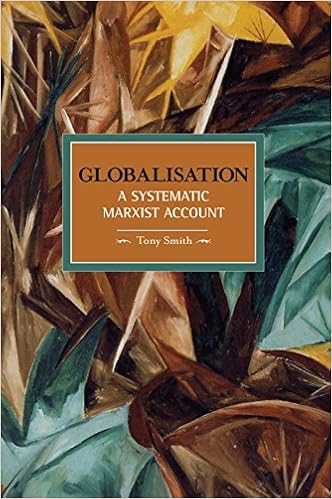And they will be right.
I have been reading: "Globalisation: A Systematic Marxian Account" by the excellent Tony Smith,
 |
| Amazon link |
and I have read no other account of globalisation so sophisticated, profound or analytic (a detailed review here).
---
We all want some kind of roadmap, a clue as to where human civilisation is heading in the twenty first century. Smith reviews four contemporary theories:
- Traditional social-democracy: capitalism plus a redistributive national state
- Neoliberalism: emphasising the benign power of global markets
- The "catalytic state": exemplified by the Chinese activist-state model
- A putative 'democratic world-state' checking the power of global capital.
All these models assume global capitalism and seek to ameliorate its more perverse or dire effects, those currently creating the popular backlash against the dominant neoliberal ideology - so-called 'populism'.
Smith then cruelly eviscerates each of these models, giving a master-class elaboration of the Marxist approach to economics. It might help to have read Michael Heinrich's "An Introduction to the Three Volumes of Karl Marx's Capital" first.
 |
| Amazon link |
Such criticism is fine: indeed, a breath of fresh air. Where Marxism fails is not so much in the analysis - who could deny that the 'structures' of society are, in any deep analysis, highly-sophisticated protocols of systematised (but malleable) human behaviour? - but in the remedy.
Describing capitalism for what it is should be ethically-neutral .. in the tradition of scientific analysis.No Marxist analysis has, for example, demonstrated that capitalism would collapse through its own inner nature through some terminal crisis.
But Marxists then add something new and extraneous: an ethical criticism.
They claim that capitalism is inherently unfair, oppressive and - dare I say it? - evil. In opposition, a communitarian solution is proposed (although the Marxist tradition was - and is - understandably sketchy on the details).
The model of future-communism is seldom subject to the level of rigorous criticism correctly bestowed on capitalism, but if it was, it would be understood to be an impossibility. It presupposes a biological human nature which does not exist.
---
There have been precisely zero attempts to integrate Marxism with current understanding of human (evolutionary) psychology, genetics or genomics. Attempts to do so are disavowed as if some category error is being proposed. Marxist blank-slatism reacts with horror to the idea that there could even be such a thing as human nature, detachable from specific and historic relations of production and exchange.
Such a lack of seriousness: the sure hallmarks of an ideology to be taken on faith.
If we learned one thing from Marx, let alone from the Stalinist experience, it's that lack of development of the productive forces is the root of all evil. Conversely, as capitalism increases those forces seemingly without limit, who can predict - yes, who? - as to how future-humanity may be able to organise itself?
In the meantime, let's just crack on and increase those productive forces, while ameliorating the consequences of their current inadequacy.*
---
* Yep, a lot of people think that. And then the arguments start 😟 ..
No comments:
Post a Comment
Comments are moderated. Keep it polite and no gratuitous links to your business website - we're not a billboard here.